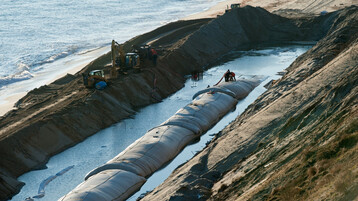Mea Culpa: SBPF Apologizes To Conservation Commission
Jason Graziadei •

One month after a stinging defeat in Nantucket Superior Court, the Sconset Beach Preservation Fund (SBPF) has issued an apology to the Conservation Commission, the local regulatory board it has been feuding with for years.
The apology, written by SBPF president Josh Posner on Wednesday, follows the decision by Judge Mark Gildea to uphold the Conservation Commission's order to remove the controversial erosion-control geotubes installed at the base of the Sconset Bluff along Nantucket's eastern shoreline.
"SBPF apologizes to the Commission (and to the Town) for allowing the current situation to get to this point for all concerned," Posner wrote in the letter. "SBPF sincerely regrets that we allowed the project to fall out of compliance with the sand delivery requirements of the Order of Conditions issued by the Commission...In retrospect, SBPF should have stayed in compliance, handed the project to another party to maintain compliance, or initiated removal or other actions under the approval of the Commission."
Read Posner's full letter by clicking here
But it wasn't the only letter Posner wrote this week. In a separate correspondence, co-signed by Nantucket town manager Libby Gibson, Posner requests that the Conservation Commission suspend the implementation of its removal order of the geotubes and allow SBPF to come into compliance with the terms of its permit, specifically by dumping thousands of cubic yards of sand onto the bluff in 2023. The new "compliance plan" would supply 100 percent of the accumulated sand deficiency that was the source of the original violation.
The two letters came as the Conservation Commission prepares to decide how to enforce its order to remove the geotubes now that the litigation has been settled, and a judge has ruled that it acted within its authority.
Posner and Gibson warned that a "hasty removal" of the geotubes could result in an "imminent bluff collapse" that would cause the loss of homes, infrastructure, and the closure of Baxter Road.
"As the Commission has judicially confirmed authority to order removal of the project, there is no risk of its authority to suspect this order in consideration of alternative compliance, project alteration, and reasonable prudence and safety measures," Gibson and Posner wrote to Conservation Commission chair Ashley Erisman.
Read Posner & Gibson's joint letter
The letter also indicates the town and the SBPF intend to file a new Notice of Intent to the Conservation Commission to "alter the project" despite the pending enforcement order for removal.
"Despite prior noncompliance, the property owners and the Town have rights under the state and local wetland protection rules, and it is our desire to see the Commission approve a revised project under those rules," Posner and Gibson wrote.
The SBPF, which has poured millions of dollars into its fight to slow erosion and save homes along Baxter Road, had appealed the Conservation Commission's enforcement action back in Sept. 2021, saying it had acted “arbitrarily and capriciously, and recklessly” in ordering the removal of the geotubes.
But in a 16-page decision issued in September, Judge Mark C. Gildea rejected SBPF's claims, affirming the Conservation Commission's enforcement order for the removal of the 900-foot geotubes that have been in place along the Sconset Bluff for nearly nine years.
"This court cannot say that the commission lacks any 'ground which ‘reasonable [persons] might deem proper’ to support' the decision to order the removal of the geotube array which is not being maintained in compliance with the unchallenged conditions set out to protect surrounding areas from the effects of the project’s obstruction of natural erosion," Gildea wrote in his decision. "Accordingly, the plaintiff fails to meet its burden to demonstrate that the enforcement order is arbitrary and capricious on this basis."
Read Gildea's full decision by clicking here.
Back in June 2021, the Conservation Commission determined that the SBPF had failed to comply with its permit for the project, specifically with regard to the requirement for a certain amount of sand to be dumped annually over the geotube to replenish the area. The ConCom issued an enforcement order that month requiring the erosion control installation to be removed. Opponents believe the geotube installation has exacerbated erosion at beaches north and south of the project.
Arcadis, the town of Nantucket's consultant on coastal resiliency and the possible relocation of Baxter Road in response to ongoing erosion, had previously urged caution in removing the geotubes without a strategic plan in place for the retreat of utilities, roadways, and private property. The consultant said removal of the geotubes has the potential for "rapid and dramatic" shoreline realignment.
Judge Gildea acknowledged those concerns in his decision, but emphasized that he was limited to considering whether the Conservation Commission had a legitimate and legal basis for its enforcement order to remove the geotubes.
"This court acknowledges the potential implications of the commission’s choice to move immediately to a removal order, rather than explicitly ordering compliance, as a response to the ever-accumulating sand deficit and the plaintiff’s repeated refusal to provide such mitigation unless an expansion of the project is approved," Gildea wrote. "The implications are significant. However, it is outside the scope of the legal issues properly before the court to determine whether the risks described in the Arcadis memo are supported by substantial evidence or weigh those risks against other strategies which could hypothetically be undertaken in response to erosion. Instead, this court’s review is limited to a much narrower question: whether there was a rational basis for the exercise of discretion to pursue enforcement."
The Conservation Commission will hold public meetings to discuss the next steps and timetable for when and how the geotubes will be removed, according attorney Ben Tymann, the special municipal counsel for the commission.
